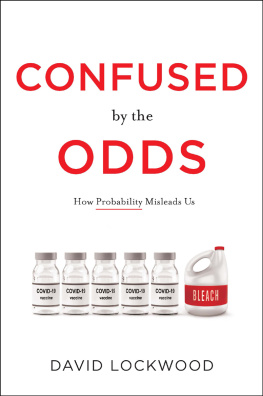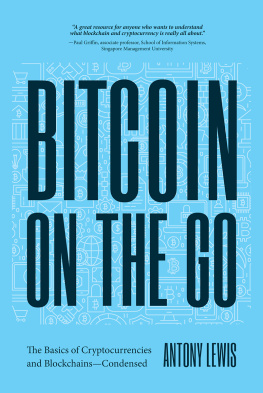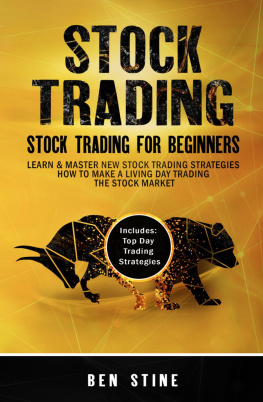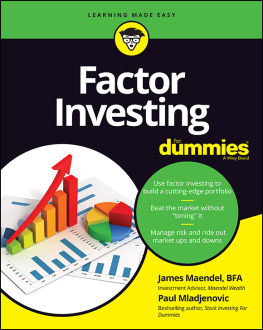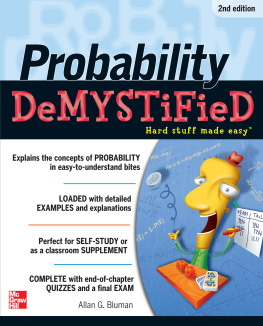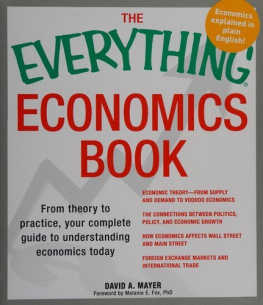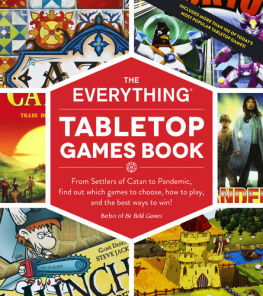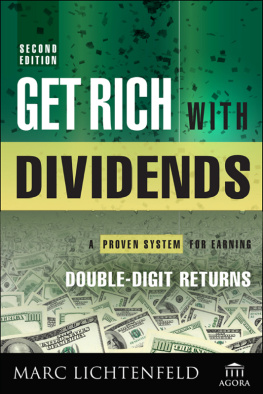CONFUSED
by the
ODDS
Also by
David Lockwood
Fooled by the Winners:
How Survivor Bias Deceives Us
Outplayed:
How Game Theory Is Used Against Us

Published by Greenleaf Book Group Press
Austin, Texas
www.gbgpress.com
Copyright 2023 David Lockwood
All rights reserved.
Thank you for purchasing an authorized edition of this book and for complying with copyright law. No part of this book may be reproduced, stored in a retrieval system, or transmitted by any means, electronic, mechanical, photocopying, recording, or otherwise, without written permission from the copyright holder.
Distributed by Greenleaf Book Group
For ordering information or special discounts for bulk purchases, please contact Greenleaf Book Group at PO Box 91869, Austin, TX 78709, 512.891.6100.
Design and composition by Greenleaf Book Group
Cover design by Greenleaf Book Group
Cover Image: iStockphoto/mrgao and iStockphoto/Nerthuz
Publishers Cataloging-in-Publication data is available.
Print ISBN: 979-8-88645-003-3
eBook ISBN: 979-8-88645-004-0
Part of the Tree Neutral program, which offsets the number of trees consumed in the production and printing of this book by taking proactive steps, such as planting trees in direct proportion to the number of trees used: www.treeneutral.com

Printed in the United States of America on acid-free paper
22 23 24 25 26 27 28 29 10 9 8 7 6 5 4 3 2 1
First Edition
To my family
I know too well that these arguments from probabilities are imposters, and unless great caution is observed in the use of them, they are apt to be deceptive.
PLATO, Phaedo
Doctors say that Nordberg has a 5050 chance of living, though theres only a 10 percent chance of that.
POLICE CAPTAIN ED HOCKEN, played by George Kennedy in the movie The Naked Gun: From the Files of Police Squad!
CONTENTS
INTRODUCTION
COVID-19 and Coins
Medical Tests: Dont Panic
After an annual physical, you receive an unexpected call from the doctor.
You tested positive for the coronavirus, she says.
You are surprised. Only one in one hundred individuals in the local community are infected. But the doctor states that the test is 90 percent accurate. In other words, if you have the coronavirus, there is a 90 percent chance you will test positive, and if you do not have the virus, there is a 90 percent chance you will test negative.
Your heart sinks.
But then the doctor calmly states, Dont panic. There is only an 8 percent chance you have COVID-19.
She is correct. You have been misled by probability.
Probability
Probability is the branch of mathematics that tells us the odds something could happen. It helps us understand the past and predict the future.
We do not have a perfect knowledge of the world around us and how it works, so uncertainty is a basic part of the human experience. In the case of COVID-19, a positive test result does not necessarily mean you are infected. Because we do not understand all there is to know about COVID-19, medical tests yield probabilities, not certainties. In fact, we cannot even predict the outcome of a simple coin toss. We dont know enough about the exact twitches of muscles in the hand, the air currents in the room, the irregularities on the surface of the table, etc., to determine whether the result will be heads or tails.
It is sometimes possible for us to have good intuition about the odds of a particular outcome. For example, we know that a fair coin thrown into the air is about equally likely to land on either side. But we often do not have good intuition about how uncertainty impacts much of modern life. Hundreds of thousands of years of Homo sapiens evolution did not equip us with brains capable of easily computing the odds that we are infected with the coronavirus, given a positive test result. Until recently, this ability was not important to having more kids.
In fields as diverse as investments (expected financial returns), criminal justice (DNA evidence), science (randomized controlled experiments), and military strategy (nuclear war), probability can mislead us. In todays world, we are frequently confused by the odds.
About This Book
Many books have been published on probability, but most are laden with row after row of formulas and proofs. No such mathematical expressions are to be found here. This book presents a series of examples that illustrate how the mathematics of probability can be used to solve real-world problems. This book is about application, not theory.
We start with games involving dice and the gamblers fallacy, then examine the Monty Hall and two-child problems before moving on to real-world examples, such as falsely convicting innocent mothers of murdering their children. We discuss normal distributions and how fat tails disrupt our models of financial returns for stocks and bitcoins, income and wealth inequality, and estimates of battle deaths from global wars in the future. We then turn to the limitations of induction to determine whether reports of miracles are credible (the reason some have faith in God) and whether conclusions from randomized controlled experiments are reliable (the reason many have faith in science). Next, we explain Bayes theorem and show how this powerful tool has been used by the US military to locate sunken submarines and by billions of email users to block unwanted messages. We demonstrate how causal diagrams can untangle cause and effect in a wide variety of subjects, such as the role of genetics in intelligence and racial bias in policing. Last, we apply Bayes theorem and causal diagrams to the political polarization of the American electorate and COVID-19.
We begin in sixteenth-century Italy with the founder of the theory of probability. In addition to being a first-rate doctor and mathematician, this person was a well-respected and highly compensated astrologer.
But his career as a physician, math professor, and fortune teller came to an abrupt end after he cast the horoscope of Jesus Christ and was jailed by the Inquisition.
CHAPTER 1
The Odds: Not What You Think
Girolamo Cardano: The Founder of Probability and Bad Luck
Girolamo Cardano (15011576) was an Italian mathematician, physician, astronomer, astrologer, and professional gambler. He was the first to propose a system for the use of negative integers and to suggest the existence of imaginary numbers. Cardano was one of the most important mathematicians of his age and wrote the first known treatise on probability.
Cardano was the son of Fazio Cardano and a young woman named Chiara Micheri. Fazio did not marry Micheri until the last days of his life, many years after Cardano was born. Fazio was a close friend of Leonardo da Vinci, who frequently consulted with Fazio on questions about geometry. Cardano reports in his autobiography that he entered this world despite several repeated attempts by his mother to abort the pregnancy by ingesting poisons. He claimed this accounted for the various ailments that plagued him throughout his lifekidney trouble, heart palpitations, an infected nipple, a cleft chin, a pronounced stutter, only fourteen good teeth, and periodic impotence.
As the child of an unmarried mother, Cardano grew up poor but supported himself through gambling. He was by all accounts a brilliant student at the University of Padua and graduated with a medical degree in 1526. He applied for admission to the College of Physicians in Milan but was rejected due to his out-of-wedlock birth. Unable to find work in Milan, Cardano set himself up as a country doctor in Sacco, a small village outside Padua.

